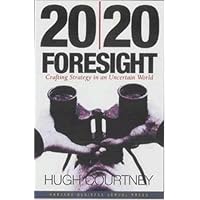
Average Reviews:

(More customer reviews)This is a nice reference work - a handbook for thinking about uncertainty. But it's not much more than that. It's nice to have under one cover a guidebook to most of the different tools that are available for dealing with uncertainty, including scenario planning, game theory, statistical forecasting/simulation, real options, etc. As such, it's a helpful guide for top corporate officers who never got MBA training (or who didn't pay attention in class). Also, it's a helpful, applied text to illustrate why all that quantitative stuff in the MBA curriculum is actually useful.
However, for companies that are up-to-snuff in having a basic capacity for strategic thinking (and it's hard to understand when a company these days is not up-to-snuff, given the expense of strategy consultants and the lack of expertise that their "green" consultants possess), the tools and approaches summarized in this book are (or should be) old hat. Contrary to what the introductory chapter implies, most of the tools from so-called "recent work" have actually been around for decades and have been taught as part of MBA and other master's degree program curricula for a long time. Serious game theory dates from the late 1970s, scenario planning became more widely known in the early to mid 1980s (a decade after developed by Royal Dutch Shell), real options analysis came into its own in the late 1980s, and forecasting/monte carlo simulation have been around for a long, long time. The book also implies that the purveyors of these tools claimed to possess " *the* solution to generating and evaluating strategies under uncertainty." Well, I don't think the creators of the tools did that... that behavior is more the territory of consultants and authors published in HBR (the publication with the fewest footnotes of any journal in the field, all the better to make old ideas seem new, which is a gripe for another forum). To my knowledge, having personally received this training and kept up with the "pop" articles in each of these tool areas, very few authors have made such claims. (To this book's credit, it is heavily footnoted.)
Nonetheless, it is helpful to have much of the literature summarized together into one book for the lay executive who hasn't thought much about these issues before or who hasn't received this kind of training. The book might also be helpful to antitrust regulators, who are sometimes too eager to see monopolies in industries that are still subject to considerable flux (the Microsoft monopoly *not* being such an instance).
One other minor flaw of the book is its straw-man attack against the typical company's "strategic-planning and decision-making toolkit", which implies that this book will somehow be revelatory to business executives. This straw-man-approach-to-strategy that the book serves up as whipping boy is more than a decade out of date. As most readers recognize, the attack is a thinly veiled criticism of Michael Porter, the intellectual champion of the "positioning school" of strategy. While the attack on Porter is spot on, the book's straw-man attack on strategy-as-practiced is not. Personally, I think the attack is just "positioning" to make the book's topics look more fresh. Criticisms about the static-ness of Porter's writings have been around for many years. Thus, the particular company that this book serves up to be the whipping boy (one of the regional Bell operating companies)--which relies only on a Five Forces or Value Chain analysis--is only reflective of a company that slept through the last decade worth of strategy and that has poorly trained planners. Strategy was, is, and continues to be more than the narrow microeconomics of Porter. Thus, to suggest that the book will suddenly open the eyes of company CEOs and analysts to the tools of dealing with residual uncertainty is, I think, overstated. As stated at the top, this is a good, concise handbook, but there's not much here that's new.
Click Here to see more reviews about: 20/20 Foresight: Crafting Strategy in an Uncertain World
Click here for more information about 20/20 Foresight: Crafting Strategy in an Uncertain World

0 comments:
Post a Comment